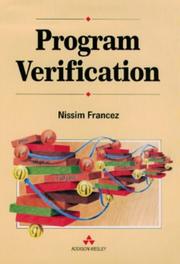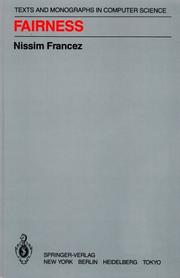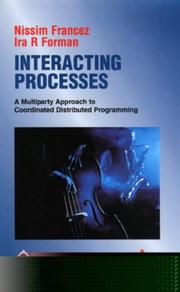| Listing 1 - 9 of 9 |
Sort by
|

ISBN: 0201416085 9780201416084 Year: 1992 Volume: vol *35 Publisher: Wokingham: Addison-Wesley,
Abstract | Keywords | Export | Availability | Bookmark
 Loading...
Loading...Choose an application
- Reference Manager
- EndNote
- RefWorks (Direct export to RefWorks)
Programming --- Computer science --- Computer software --- Verification --- Computer software - Verification. --- Computer software - Verification

ISBN: 0387962352 Year: 1986 Publisher: New York (N.Y.) : Springer,
Abstract | Keywords | Export | Availability | Bookmark
 Loading...
Loading...Choose an application
- Reference Manager
- EndNote
- RefWorks (Direct export to RefWorks)
Programming languages (Electronic computers) --- Computer programming --- Parallel processing (Electronic computers) --- Semantics --- -Computer programming --- 681.3*C12 --- 681.3*F12 --- 681.3*F32 --- Computers --- Electronic computer programming --- Electronic data processing --- Electronic digital computers --- Programming (Electronic computers) --- Coding theory --- Programming language semantics --- High performance computing --- Multiprocessors --- Parallel programming (Computer science) --- Supercomputers --- Multiple data stream architectures (multiprocessors): MIMD; SIMD; pipeline and parallel processors; array-, vector-, associative processors; interconnection architectures: common bus, multiport memory, crossbar switch --- Modes of computation: alternation and nondeterminism; parallelism; probabilistic computation; relations among modes; relativized computation --- Semantics of programming languages: algebraic approaches to semantics; denotational semantics; operational semantics (Logics and meanings of programs)--See also {681.3*D31} --- Programming --- Computer programming. --- Semantics. --- Parallel processing (Electronic computers). --- 681.3*F32 Semantics of programming languages: algebraic approaches to semantics; denotational semantics; operational semantics (Logics and meanings of programs)--See also {681.3*D31} --- 681.3*F12 Modes of computation: alternation and nondeterminism; parallelism; probabilistic computation; relations among modes; relativized computation --- 681.3*C12 Multiple data stream architectures (multiprocessors): MIMD; SIMD; pipeline and parallel processors; array-, vector-, associative processors; interconnection architectures: common bus, multiport memory, crossbar switch
Book
ISBN: 9781848901834 1848901836 Year: 2015 Volume: 57 Publisher: London: College Publications,
Abstract | Keywords | Export | Availability | Bookmark
 Loading...
Loading...Choose an application
- Reference Manager
- EndNote
- RefWorks (Direct export to RefWorks)
This book is a monograph on the topic of Proof-Theoretic Semantics, a theory of meaning constituting an alternative to the more traditional Model-Theoretic Semantics. The latter regards meaning as truth-conditions (in arbitrary models), the former regards meaning as canonical derivability conditions in a meaning-conferring natural-deduction proof-system. In the first part of the book, the Proof-Theoretic Semantics for logic is presented. It surveys the way a natural-deduction system can serve as meaning-conferring, and in particular analyses various criteria such a system has to meet in order to qualify as meaning-conferring. A central criterion is harmony, a balance between introduction-rules and elimination-rules. The theory is applied to various logics, e.g., relevance logic, and various proof systems such as multi-conclusion natural-deduction and bilateralism. The presentation is inspired by recent work by the author, and also surveys recent developments. In part two, the theory is applied to fragments of natural language, both extensional and intensional, a development based on the author's recent work. For example, conservativity of determiners, once set up in a proof-theoretic framework, becomes a provable property of all (regular) determiners. It is shown that meaning need not carry the heavy ontological load characteristic of Model-Theoretic Semantics of complex natural language constructs. Nissim Francez is an emeritus professor of computer science at the Technion, Israel Institute of Technology. At a certain point in his career he moved from research related to concurrent and distributed programming and program verification to research in computational linguistics, mainly formal semantics of natural language. In recent years, he has worked on Proof-Theoretic Semantics, in particular for natural language.
Logic, symbolic and mathematical --- Proof theory --- Semantics

ISBN: 3540962352 0387962352 9783540962359 9780387962351 Year: 1986 Publisher: New York: Springer,
Abstract | Keywords | Export | Availability | Bookmark
 Loading...
Loading...Choose an application
- Reference Manager
- EndNote
- RefWorks (Direct export to RefWorks)
Book
Year: 1983 Publisher: San Jose IBM. Research division
Abstract | Keywords | Export | Availability | Bookmark
 Loading...
Loading...Choose an application
- Reference Manager
- EndNote
- RefWorks (Direct export to RefWorks)

ISBN: 0201565285 9780201565287 Year: 1996 Publisher: Harlow: Addison-Wesley,
Abstract | Keywords | Export | Availability | Bookmark
 Loading...
Loading...Choose an application
- Reference Manager
- EndNote
- RefWorks (Direct export to RefWorks)
Book
ISBN: 3642017479 3642017487 Year: 2009 Publisher: Berlin : Springer,
Abstract | Keywords | Export | Availability | Bookmark
 Loading...
Loading...Choose an application
- Reference Manager
- EndNote
- RefWorks (Direct export to RefWorks)
This Festschrift volume, published in honor of Nissim Francez on the occasion of his 65th birthday, contains 15 papers, written by friends and colleagues, many of whom congregated at a celebratory symposium held on May 24-25, 2009, in Haifa, Israel. The theme of the symposium was Languages: From Formal to Natural, reflecting the focus of Nissim Francez' research career, which started in program verification and the semantics of programming languages and later concentrated on natural languages and computational linguistics. The papers included in this volume cover the entire spectrum of this field of research.
Mathematical Theory --- Computer Science --- Engineering & Applied Sciences --- Mathematics --- Physical Sciences & Mathematics --- Computer programming. --- Programming languages (Electronic computers) --- Computer languages --- Computer program languages --- Computer programming languages --- Machine language --- Computers --- Electronic computer programming --- Electronic data processing --- Electronic digital computers --- Programming (Electronic computers) --- Programming --- Computer science. --- Arithmetic and logic units, Computer. --- Computers. --- Computer logic. --- Mathematical logic. --- Computer Science. --- Mathematical Logic and Formal Languages. --- Mathematical Logic and Foundations. --- Logics and Meanings of Programs. --- Theory of Computation. --- Arithmetic and Logic Structures. --- Algebra of logic --- Logic, Universal --- Mathematical logic --- Symbolic and mathematical logic --- Symbolic logic --- Algebra, Abstract --- Metamathematics --- Set theory --- Syllogism --- Computer science logic --- Logic, Symbolic and mathematical --- Automatic computers --- Automatic data processors --- Computer hardware --- Computing machines (Computers) --- Electronic brains --- Electronic calculating-machines --- Electronic computers --- Hardware, Computer --- Computer systems --- Cybernetics --- Machine theory --- Calculators --- Cyberspace --- Arithmetic and logic units, Computer --- Computer arithmetic --- Informatics --- Science --- Circuits --- Coding theory --- Languages, Artificial --- Logic, Symbolic and mathematical. --- Logic design. --- Information theory. --- Communication theory --- Communication --- Design, Logic --- Design of logic systems --- Digital electronics --- Electronic circuit design --- Logic circuits --- Switching theory
Book
ISBN: 9781139224628 113922462X 9781139013574 1139013572 9781139221191 1139221191 9781139218108 1139218107 9781107014176 1107014174 1107229766 1280485280 1139222902 9786613580269 1139215019 Year: 2012 Publisher: Cambridge Cambridge University Press
Abstract | Keywords | Export | Availability | Bookmark
 Loading...
Loading...Choose an application
- Reference Manager
- EndNote
- RefWorks (Direct export to RefWorks)
Grammars of natural languages can be expressed as mathematical objects, similar to computer programs. Such a formal presentation of grammars facilitates mathematical reasoning with grammars (and the languages they denote), as well as computational implementation of grammar processors. This book presents one of the most commonly used grammatical formalisms, Unification Grammars, which underlies contemporary linguistic theories such as Lexical-Functional Grammar (LFG) and Head-driven Phrase Structure Grammar (HPSG). The book provides a robust and rigorous exposition of the formalism that is both mathematically well-founded and linguistically motivated. While the material is presented formally, and much of the text is mathematically oriented, a core chapter of the book addresses linguistic applications and the implementation of several linguistic insights in unification grammars. Dozens of examples and numerous exercises (many with solutions) illustrate key points. Graduate students and researchers in both computer science and linguistics will find this book a valuable resource.
Grammar, Comparative and general --- Head-driven phrase structure grammar --- Lexical-functional grammar --- Unification grammar --- HPSG (Linguistics) --- Phrase structure grammar --- Mathematical linguistics --- Generative grammar --- Mathematical models --- Unification --- Lexical-functional grammar. --- Unification grammar. --- Head-driven phrase structure grammar. --- Mathematical models. --- Information Technology --- Computer Science (Hardware & Networks) --- Linguistics --- Philology
Book
Year: 1988 Publisher: Austin University of Texas. Department of computer sciences
Abstract | Keywords | Export | Availability | Bookmark
 Loading...
Loading...Choose an application
- Reference Manager
- EndNote
- RefWorks (Direct export to RefWorks)
| Listing 1 - 9 of 9 |
Sort by
|

 Search
Search Feedback
Feedback About UniCat
About UniCat  Help
Help News
News